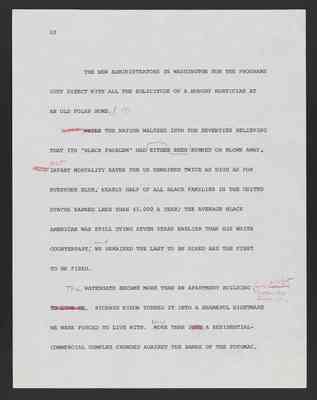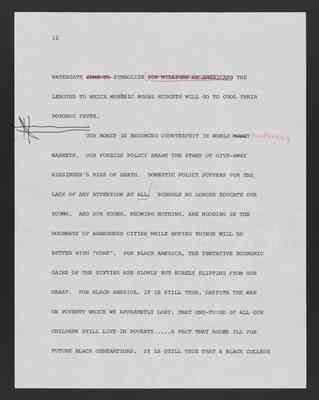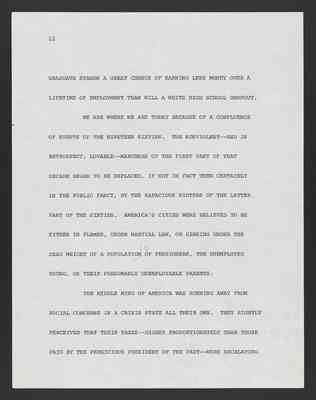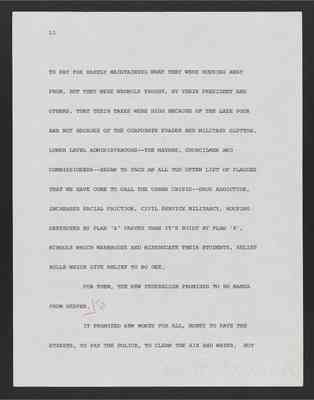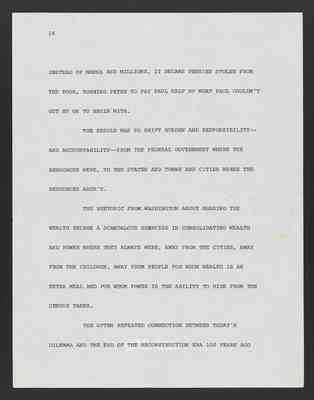Pages
16
10
The new administration in Washington run the programs they direct with all the solicitude of a hungry mortician at an old folks home.10
While The nation waltzed into the seventies believing that its "black problem" had been either burned or blown away. But infant mortality rates for us remained twice as high as for everyone else; nearly half of all black families in the United States earned less than $5,000 a year; the average Black American was still dying seven years earlier than his white counterpart; and we remained the last to be hired and the first to be fired.
The Watergate became more than an apartment building we might choose to live in. Richard Nixon turned it into a shameful nightmare we were forced to live with. Now more than just a residential-commercial complex crowded against the banks of the Potomac,
17
11
Watergate came to symbolizes for miliions of Americans the lengths to which moronic moral midgets will go to cool their Potomac fever.
Our money is becoming counterfeit in world money currency markets. Our foreign policy bears the stamp of give-away Kissinger's kiss of death. Domestic policy suffers for the lack of any attention at all.
Schools no longer educate our young. And our young, knowing nothing, are nodding in the doorways of abandoned cities while hoping things will go better with "coke". For black America, the tentative economic gains of the sixties are slowly but surely slipping from our grasp. For black America, it is still true, despite the war on poverty which we apparently lost, that one-third of all our children still live in poverty ... A fact that bodes ill for future black generations. It is still true that a black college
18
12
graduate stands a great chance of earning less money over a lifetime of employment than will a white high school dropout.
We are where we are today because of a confluence of events of the nineteen sixties. The nonviolent -- and in retrospect, lovable -- marchers of the first part of that decade began to be replaced, if not in fact then certainly in the public fancy, by the rapacious rioters of the latter part of the sixties. America's cities were believed to be either in flames, under martial law, or sinking under the dead weight of a population12 of pensioners, the unemployed young, or their presumably unemployable parents.
The middle mind of America was running away from social concerns in a crisis state all their own. They rightly perceived that their taxes -- higher proportionately than those paid by the pernicious President of the past -- were escalating
19
13
to pay for barely maintaining what they were running away from, but they were wrongly taught, by their President and others, that their taxes were high because of the laze poor and not because of their corporate evader and military glutton. Lower level administrators -- the Mayors, Councilmen and Commissioners -- began to face an all too often list of plagues that we have come to call the urban crisis -- drug addiction, increased racial friction, civil service militancy, housing destroyed by plan 'A' faster than it's built by plan 'B', schools which warehouse and miseducate their students, relief rolls which give relief to no one.
For them, the New Federalism promised to be manna from heaven.13
It promised new money for all, money to pave the streets, to pay the police, to clean the air and water. But
20
14
instead of manna and millions, it became pennies stolen from the poor, robbing Peter to pay Paul half of what Paul couldn't get by on to begin with.
The result was to shift burden and responsibility—and accountability—from the federal government where the resources were, to the states and towns and cities where the resources aren't.
The rhetoric from Washington about sharing the wealth became a scandalous exercise in consolidating wealth and power where they alway were, away from the cities, away from the children, away from people for whom wealth is an extra meal and for whom power is the ability to hide from the census taker.
The often repeated connection between today's dilemma and the end of the reconstruction era 100 years ago
